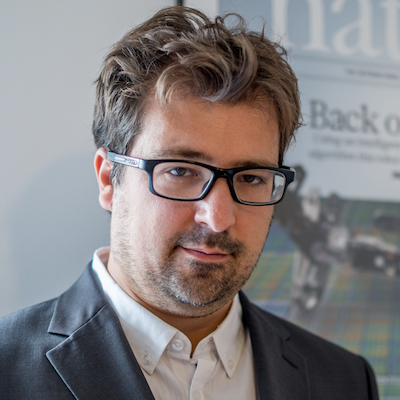Keynotes
Grigoris Antoniou

Title: Semantics and Reasoning in the Big Data Era
Abstract:Data originating from the Web, sensor networks and social media result in increasingly huge datasets. The so called Big Data creates new opportunities for advanced applications in domains ranging from smart cities to intelligent healthcare, hence the increasing interest in academia and industry. Usually Big Data is associated with machine learning / data mining. This talk will argue that semantic and knowledge technologies have an important role to play. Traditionally, reasoning approaches have mostly focused on complex knowledge structures/programs and centralized in-memory data, so the question arises whether and how they can be adapated to scale sufficiently to meet the Big Data challenges. This talk will review seminal work on large-scale massively parallel RDFS reasoning, before turning its attention to more recent works addressing more complex reasoning tasks. The talk will conclude with a number of open research challenges in the area, and possible applications in the legal domain in the context of the EU-funded MIREL project.
Bio: Grigoris Antoniou is Professor of Computer Science at the University of Huddersfield, UK. Previously he has held professorial appointments at the University of Crete (where he was also Head of the Information Systems Laboratory at FORTH-ICS, the top-rated research institute in Greece), Griffith University, Australia, and the University of Bremen, Germany. His research interests lie in semantic technologies, particularly knowledge representation and reasoning and semantics for big data, and its application to ambient intelligence, e-health, and transportation. He has published over 200 technical papers in scientific journals and conferences. He is author of three books with international publishers (MIT Press, Addison-Wesley); his book “A Semantic Web Primer” is internationally the standard textbook in the area, and has been or is about to be translated to Japanese, Chinese, Korean, Spanish and Greek. His research has attracted around 10.000 citations. In recognition of his work, he was elected an EurAI Fellow in 2006, joining the prestigious list of the best AI researchers in Europe. He is member of three editorial boards of journals, has organised a number of conferences and workshops (including leadership positions at ESWC 2010 and 2011), and has served in numerous programme committees. He has led a number of national and international research projects, and has participated in many more.
Jean-Baptiste Mouret

Title: Designing robots that can learn: why, when, and how?
Abstract:The recent advances in deep learning are generating an impressive interest in machine learning, but their influence on robotics is not as strong as we could think (yet). In this talk, I will show in which situations robots can benefit from learning and what constraint robots impose on learning algorithms. Focusing on trial-and-error learning, I will then introduce the work of our team to address these challenges, in particular to allow legged robots to recover from mechanical damage in a few minutes.
Bio: Dr. Jean-Baptiste Mouret is a senior researcher ("Directeur de recherche") at Inria, the French research institute dedicated to computer science and mathematics, and he is currently the principal investigator of an ERC grant (ResiBots – Robots with animal-like resilience, 2015-2020). Overall, J.-B. Mouret conducts researches that intertwine machine learning, robotics, and evolutionary computation to make robots that can adapt as quickly and as creatively as possible. His work was recently featured on the cover of Nature ("Robots that adapt like animals", Cully et al., 2015) and it received several national and international scientific awards, including the "Prix La Recherche 2016”, the "Distinguished Young Investigator in Artificial Life 2017”, and several best paper awards in major conferences of his field. Before joining Inria, he was an assistant professor ("maitre de conferences") at the Pierre and Marie Curie University (now Sorbonne Universite) in Paris, France (2009-2015).
Eleni Stroulia

Title: Research Challenges around Smart Indoor Spaces
Abstract:The advancement of Internet of Things (IoT) technologies is promising to revolutionize many aspects of our life, and key among them is the spaces where we live, study, and work. Sensors embedded in our homes and buildings enable the systematic analysis and quantification of our activities in these spaces, and, in turn, afford us the opportunity to make informed decisions on (a) how to optimize the safety and comfort of the buildings’ occupants and (b) how to reduce the energy consumed by these buildings and their impact to the environment. In this presentation, I will review the key challenges in this area and I will present some of our recent solutions.
Bio: Dr. Eleni Stroulia is a Professor in the Department of Computing Science, at the University of Alberta. From 2011-2016, she held the NSERC/AITF Industrial Research Chair on Service Systems Management, with IBM. Her research focuses on addressing industry-driven problems, adopting AI and machine-learning methods to improve or automate tasks. Her flagship project in the area of health care is the Smart Condo in which she investigates the use of technology to support people with chronic conditions live independently longer and to educate health-science students to provide better care for these clients. In 2011, the Smart-Condo team received the UofA Teaching Unit Award. She has played leadership roles in the GRAND and AGE-WELL NCEs, the SAVI Strategic Network and the DITA CREATE network and in 2018 she received a McCalla professorship for her innovative integration of research and teaching.
https://www.ualberta.ca/science/about-us/contact-us/faculty-directory/eleni-stroulia
©Designed and Developed by AIGROUP @ UPATRAS